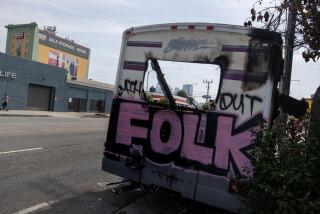State appeals court overturns ban on LAPD’s vehicle impound policy
- Share via
A state appeals court panel Friday overturned a ban on the Los Angeles Police Department’s controversial vehicle impound policy that restricts when officers can seize the cars of unlicensed drivers.
The three-judge panel from California’s second appellate district found unanimously in favor of the LAPD and Chief Charlie Beck. In 2012, when he implemented the impound policy, Beck thrust the department squarely into the contentious debate over the rights of immigrants who are in the country illegally.
Under the terms of the policy, called Special Order 7 by the department, if police stop an unlicensed driver who meets several requirements — including having auto insurance, valid identification and no previous convictions for unlicensed driving — officers cannot invoke the part of the state vehicle code that authorizes them to confiscate the vehicle for 30 days, a punishment that comes with costly fines and charges.
In a city with roughly 400,000 immigrants who are in the country illegally and forbidden by state law to obtain driver’s licenses, Beck argued the monthlong impounds unfairly burdened such drivers, who often have few practical options other than to risk having their cars seized in order to drive to work or take their children to school.
The Police Protective League, the union that represents the LAPD’s rank-and-file officers, and a Los Angeles resident sued over the policy, arguing Beck was illegally attempting to supersede state laws governing vehicle impounds.
In a statement, the LAPD said it was “pleased by the court’s decision reaffirming the department’s authority to provide direction to its officers regarding this important matter. Maintaining the public’s trust is improved when the communities we serve believe the actions of our officers are fair, consistent and constitutional in each neighborhood of the city.”
Peter Bibring, an attorney for the Southern California chapter of the ACLU, which was part of the coalition supporting the LAPD’s policy, echoed the department, saying the ruling was “a big win for police-community relations.”
As the case wound its way through the courts, legislators last year passed a law that beginning on Jan. 1 will give immigrants in the country illegally the right to be issued driver’s licenses. That law, and how it might affect Special Order 7, was not addressed in Friday’s ruling.
Bibring said the judges’ decision was still important because there could be problems with the law’s rollout and, inevitably, some people will not apply for driver’s licenses.
But it seems the law could create uncomfortable scenarios for Beck.
For example, an immigrant in the country illegally could apply for a license but fail to pass the tests required to receive one. That person could go on driving without a license and, under the LAPD’s policy, might avoid having his car impounded despite not being qualified to drive in the eyes of the state.
Friday’s decision, which was widely expected in light of the tough grilling the judges gave attorneys representing the union and the resident, reverses a lower court’s finding that the impound policy was illegal.
In their written ruling, the appellate judges concluded that neither the union nor the resident, Harold Sturgeon, had legal standing to challenge the policy. They also rejected the argument that Beck had overstepped, saying the policy fell within the chief’s broad authority to implement state laws.
The impound policy had remained in effect throughout the appeals process.
Attorney Richard Levine, who represented the Police Protective League, said union officials were still reviewing the ruling and would decide in the coming week whether to appeal to the state Supreme Court.
Twitter: @joelrubin
More to Read
Sign up for Essential California
The most important California stories and recommendations in your inbox every morning.
You may occasionally receive promotional content from the Los Angeles Times.














